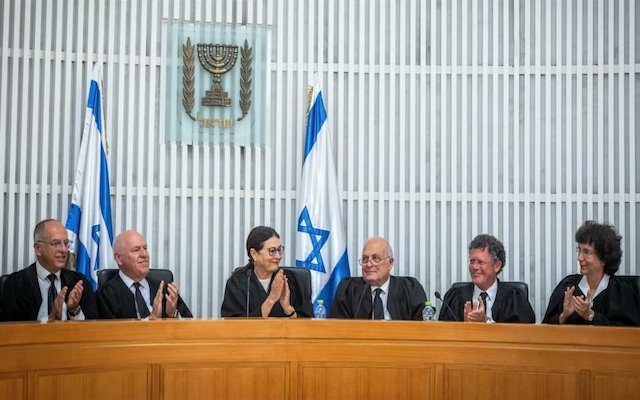Amid the nationwide protests taking place in Israel against the legislation to end major significance to the “Reasonableness Clause”, Israeli Supreme Court Justices were recorded bickering about the meaning of the legislation. In the ruling handed down Monday in the petition of Prime Minister Netanyahu who demanded to order the opening of an investigation into the leaking of investigative materials in the cases against him, this rare harsh exchange between judges took place.
On one side stands Judge Noam Solberg, who according to the seniority system, if he continues to act, is expected to become the president of the Supreme Court at the end of 2028. On the other side stood the judge and Prof. Dafna Barak Erez, who according to the same system is supposed to inherit the position a little more than three years later.
"Israel’s cabinet is not trying to crush the Israeli Supreme Court. It is trying to rein in a runaway court comprised of unelected judges who have struck down laws & govt. officials’ actions that they did not like under a vague “reasonableness” standard."https://t.co/2yv4QK7B17
— Dan (@Dan19726) July 17, 2023
The fire was ignited by Barak Erez, who decided to add a few incidental comments to the main opinion on Netanyahu’s request, which was written by Judge Khaled Kabov and to which both Solberg and she agreed. In her comment, Barak Erez noted, among other things, "From my point of view, the context of the discussion is even broader - the criticism of the administrative discretion, using the ‘Reasonableness Clause’. The petition before us, like many before it since the early days of the State of Israel, is based on the claim that the administrative decision that was made, in the event, is the decision of the Legal Adviser to the Government, which is extremely unreasonable.
In light of this, Barak Erez added her firm statement, "In fact, without this development, that is, without the ground of general reasonableness as an inseparable part of the grounds of review of the administrative court, there would have been no revival of this petition and petitions similar to it."
Judge Solberg very much disliked this side comment, and lashed out against it, "After these words, I read the words of my friend, Judge D. Barak-Erez, who saw fit to explain, even briefly, her opinion regarding the reason for reasonableness. Other opinions and views, In any case, noting that in the present petition, the question of the nature and scope of the ‘Reasonableness Clause’ was not sharpened at all; neither in the petition nor in the response. I do not believe that this is the place and this is the time to do so; it is better for us not to make the petition a loophole to define ourselves."
Haim Har Zahav: Abolishing the reasonableness principle does not "harm the High Court", not "screw the judges" & is not "against the left".
— (((Rabbi_L_Sykes))) (@Rabbi_Sykes) July 18, 2023
The cancellation of the reasonableness principle means that if tomorrow, some government makes a decision that personally ruined your life, https://t.co/AF0ciNYnX0
Solberg continued: "There is also no justification to divert the center of gravity of our discussion from the leak, to the plausibility. In relation to these things, it is worth remembering and reminding that even though the ‘Reasonableness Clause’ gradually spread, and according to President of the Court Asher Grunis, ‘it swallowed into it, like an insatiable person, particular clauses that were recognized in the past’. Still, this reason, important, but problematic, is not the be-all and end-all; Surely it is not a condition without it. There is no standing for petitions of the type of the petition before us."


